第二十二届韩素音青年翻译奖竟赛英译汉译文
韩素音翻译大赛详解
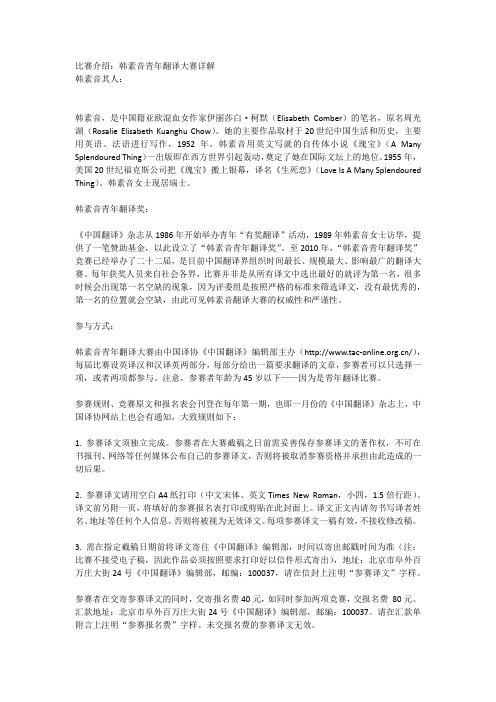
比赛介绍:韩素音青年翻译大赛详解韩素音其人:韩素音,是中国籍亚欧混血女作家伊丽莎白·柯默(Elisabeth Comber)的笔名,原名周光湖(Rosalie Elisabeth Kuanghu Chow)。
她的主要作品取材于20世纪中国生活和历史,主要用英语、法语进行写作,1952年,韩素音用英文写就的自传体小说《瑰宝》(A Many Splendoured Thing)一出版即在西方世界引起轰动,奠定了她在国际文坛上的地位。
1955年,美国20世纪福克斯公司把《瑰宝》搬上银幕,译名《生死恋》(Love Is A Many Splendoured Thing)。
韩素音女士现居瑞士。
韩素音青年翻译奖:《中国翻译》杂志从1986年开始举办青年“有奖翻译”活动,1989年韩素音女士访华,提供了一笔赞助基金,以此设立了“韩素音青年翻译奖”。
至2010年,“韩素音青年翻译奖”竞赛已经举办了二十二届,是目前中国翻译界组织时间最长、规模最大、影响最广的翻译大赛。
每年获奖人员来自社会各界,比赛并非是从所有译文中选出最好的就评为第一名,很多时候会出现第一名空缺的现象,因为评委组是按照严格的标准来筛选译文,没有最优秀的,第一名的位置就会空缺,由此可见韩素音翻译大赛的权威性和严谨性。
参与方式:韩素音青年翻译大赛由中国译协《中国翻译》编辑部主办(/),每届比赛设英译汉和汉译英两部分,每部分给出一篇要求翻译的文章,参赛者可以只选择一项,或者两项都参与。
注意,参赛者年龄为45岁以下——因为是青年翻译比赛。
参赛规则、竞赛原文和报名表会刊登在每年第一期,也即一月份的《中国翻译》杂志上,中国译协网站上也会有通知,大致规则如下:1. 参赛译文须独立完成。
参赛者在大赛截稿之日前需妥善保存参赛译文的著作权,不可在书报刊、网络等任何媒体公布自己的参赛译文,否则将被取消参赛资格并承担由此造成的一切后果。
2. 参赛译文请用空白A4纸打印(中文宋体、英文Times New Roman,小四,1.5倍行距)。
“戴着镣铐跳舞”再思考——兼及翻译比喻之分类
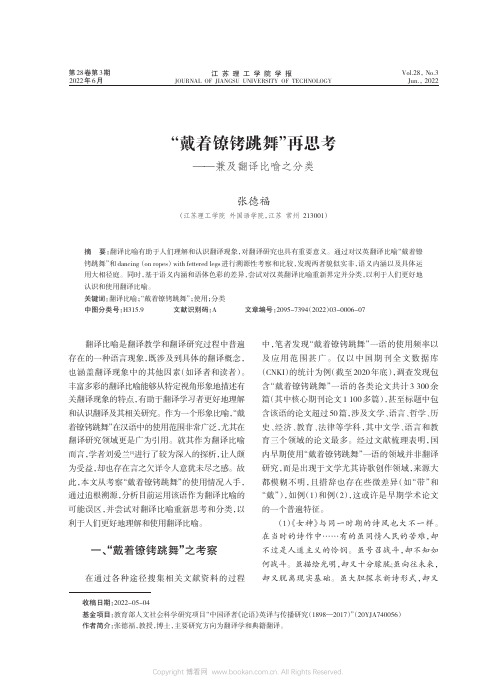
第28卷第3期江苏理工学院学报JOURNAL OF JIANGSU UNIVERSITY OF TECHNOLOGYVo l.28,No.3Jun.,20222022年6月翻译比喻是翻译教学和翻译研究过程中普遍存在的一种语言现象,既涉及到具体的翻译概念,也涵盖翻译现象中的其他因素(如译者和读者)。
丰富多彩的翻译比喻能够从特定视角形象地描述有关翻译现象的特点,有助于翻译学习者更好地理解和认识翻译及其相关研究。
作为一个形象比喻,“戴着镣铐跳舞”在汉语中的使用范围非常广泛,尤其在翻译研究领域更是广为引用。
就其作为翻译比喻而言,学者刘爱兰[1]进行了较为深入的探析,让人颇为受益,却也存在言之欠详令人意犹未尽之感。
故此,本文从考察“戴着镣铐跳舞”的使用情况入手,通过追根溯源,分析目前运用该语作为翻译比喻的可能误区,并尝试对翻译比喻重新思考和分类,以利于人们更好地理解和使用翻译比喻。
一、“戴着镣铐跳舞”之考察在通过各种途径搜集相关文献资料的过程中,笔者发现“戴着镣铐跳舞”一语的使用频率以及应用范围甚广。
仅以中国期刊全文数据库(CNKI )的统计为例(截至2020年底),调查发现包含“戴着镣铐跳舞”一语的各类论文共计3300余篇(其中核心期刊论文1100多篇),甚至标题中包含该语的论文超过50篇,涉及文学、语言、哲学、历史、经济、教育、法律等学科,其中文学、语言和教育三个领域的论文最多。
经过文献梳理表明,国内早期使用“戴着镣铐跳舞”一语的领域并非翻译研究,而是出现于文学尤其诗歌创作领域,来源大都模糊不明,且措辞也存在些微差异(如“带”和“戴”),如例(1)和例(2),这或许是早期学术论文的一个普遍特征。
(1)《女神》与同一时期的诗风也大不一样。
在当时的诗作中……有的虽同情人民的苦难,却不过是人道主义的怜悯。
虽号召战斗,却不知如何战斗。
虽描绘光明,却又十分朦胧;虽向往未来,却又脱离现实基础。
虽大胆探求新诗形式,却又“戴着镣铐跳舞”再思考——兼及翻译比喻之分类收稿日期:2022-05-04基金项目:教育部人文社会科学研究项目“中国译者《论语》英译与传播研究(1898—2017)”(20YJA740056)作者简介:张德福,教授,博士,主要研究方向为翻译学和典籍翻译。
第二十八届韩素音青年翻译奖竞赛英汉汉英译文完整版

第二十八届韩素音青年翻译奖竞赛英译汉、汉译英竞赛原文英译汉竞赛原文:On IrritabilityIrritability is the tendency to get upset for reasons that seem – to other people – to be pretty minor. Your partner asks you how work went and the way they ask makes you feel intensely agitated. Your partner is putting knives and forks on the table before dinner and you mention (not for the first time) that the fork should go on the left hand side, not the right. They then immediately let out a huge sigh and sweep the cutlery onto the floor and tell you that you can xxxx-ing do it yourself if you know better. It was the most minor of criticisms and technically quite correct. And now they’ve exploded.There is so much irritability around and it exacts a huge daily cost on our collective lives, so we deserve to get a lot more curious about it: what is really going on for the irritable person? Why, really, are they getting so agitated? And instead of blaming them for getting het up about “little things”, we should do them the honour of working out why, in fact, these things may not be so minor after all.The journey begins by recognising the role of fear in irritability in couples. Behind most outbursts are cack-handed attempts to teach the other person something. There are things we’d like to point out, flaws that we can discern, remarks we feel we really must make, but our awareness of how to proceed is panicked and hasty. We give cack-handed, mean speeches, which bear no faith in the legitimacy (even the nobility) of the act of imparting advice. And when our partners are on the receiving end of these irritable “lessons”, they of course swiftly grow defensive and brittle in the face of suggestions which seem more like mean-minded and senseless assaults on their very natures rather than caring, gentle attempts to address troublesome aspects of joint life.The prerequisite of calm in a teacher is a degree of indifference as to the success or failure of the lesson. One naturally wants for things to go well, but if an obdurate pupil flunks trigonometry, it is – at base – their problem. Tempers can stay even because individual students do not have very much power over teachers’ lives. Fortunately, as not caring too much turns out to be a critical aspect of successful pedagogy.Yet this isn’t an option open t o the fearful, irritable lover. They feel ineluctably led to deliver their “lessons” in a cataclysmic, frenzied manner (the door slams very loudly indeed) not because they are insane or vile (though one could easily draw these conclusions) so much as because they are terrified; terrified of spoiling what remains of their years on the planet in the company of someone who it appears cannot in any way understand a pivotal point about conversation, or cutlery, or the right time to order a taxi.One knows intuitively, when teaching a child, that only the utmost care and patience will ever work: one must never shout, one has to use extraordinary tact, one has to make ten compliments for every one negative remark and one must leave oneself plenty of time…All t his wisdom we reliably forget in love’s classroom, sadly because increasing the level of threat seldom hastens development. We do not grow more reasonable, more accepting of responsibility and more accurate about our weaknesses when our pride has been wounded, our integrity is threatened and our self-esteem has been violated.The complaint against the irritable person is that they are getting worked up over “nothing”. But symbols offer a way of seeing how a detail can stand for something much bigger and more serious. The groceries placed on the wrong table are not upsetting at all in themselves. But symbolically they mean your partner doesn’t care about domestic order; they muddle things up; they are messy. Or the question about one’s day is experienced as a symbol of interrogation, a lack of privacy and a humiliation (because one’s days rarely go well enough).The solution is, ideally, to concentrate on what the bigger issue is. Entire philosophies of life stir and collide beneath the surface of apparently petty squabbles. Irritations are the outward indications of stifled debates between competing conceptions of existence. It’s to the bigger themes we need to try to get.In the course of discussions, one might even come face-to-face with that perennially surprising truth about relationships: that the other person is not an extension of oneself that has, mysteriously, gone off message. They are that most surprising of things, a different person, with a psyche all of their own, filled with a perplexing number of subtle, eccentric and unforeseen reasons for thinking as they do.The decoding may take time, perhaps half an hour or more of concentrated exploration for something that had until then seemed as if it would more rightfully deserve an instant.We pay a heavy price for this neglect; every conflict that ends in sour stalemate is a blocked capillary within the heart of love. Emotions will find other ways to flow for now, but with the accumulation of unresolved disputes, pathways will fur and possibilities for trust and generosity narrow.A last point. It may just be sleep or food: when a baby is irritable, we rarely feel the need to preach about self-control and a proper sense of proportion. It’s not simply that we fear the infant’s intellect might n ot quite be up to it, but because we have a much better explanation of what is going on. We know that they’re acting this way –and getting bothered by any little thing – because they are tired, hungry, too hot or having some challenging digestive episode.The fact is, though, that the same physiological causes get to us all our lives. When we are tired, we get upset more easily; when we feel very hungry, it takes less to bother us. But it is immensely difficult to transfer the lesson in generosity (and accuracy) that we gain around to children and apply it to someone with a degree in business administration or a pilot’s license, or to whom we have been married for three-and-a-half years.We should try to see irritability for what it actually is: a confused, inarticulate, often shameful attempt to get us to understand how much someone is suffering and how urgently they need our help. We should – when we can manage it – attempt to help them out.汉译英竞赛原文:屠呦呦秉持的,不是好事者争论的随着诺贝尔奖颁奖典礼的临近,持续2个月的“屠呦呦热”正在渐入高潮。
第十七届“韩素音青年翻译奖”赛(汉译英)中文原文及参考译文和解析
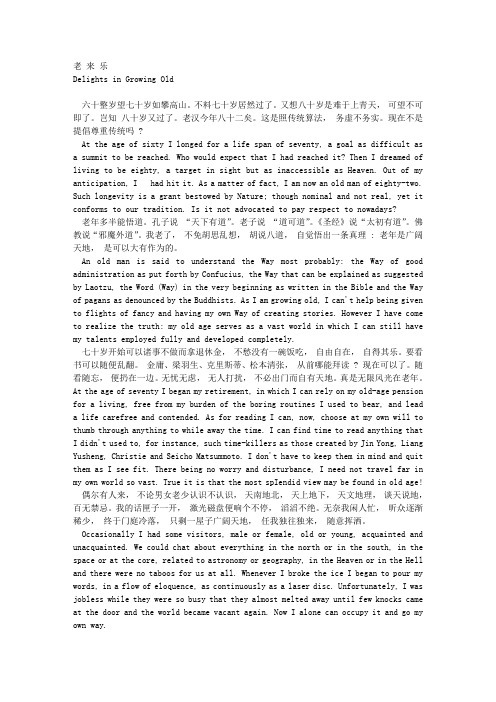
老来乐Delights in Growing Old六十整岁望七十岁如攀高山。
不料七十岁居然过了。
又想八十岁是难于上青天,可望不可即了。
岂知八十岁又过了。
老汉今年八十二矣。
这是照传统算法,务虚不务实。
现在不是提倡尊重传统吗 ?At the age of sixty I longed for a life span of seventy, a goal as difficult as a summit to be reached. Who would expect that I had reached it? Then I dreamed of living to be eighty, a target in sight but as inaccessible as Heaven. Out of my anticipation, I had hit it. As a matter of fact, I am now an old man of eighty-two. Such longevity is a grant bestowed by Nature; though nominal and not real, yet it conforms to our tradition. Is it not advocated to pay respect to nowadays?老年多半能悟道。
孔子说“天下有道”。
老子说“道可道”。
《圣经》说“太初有道”。
佛教说“邪魔外道”。
我老了,不免胡思乱想,胡说八道,自觉悟出一条真理 : 老年是广阔天地,是可以大有作为的。
An old man is said to understand the Way most probably: the Way of good administration as put forth by Confucius, the Way that can be explained as suggested by Laotzu, the Word (Way) in the very beginning as written in the Bible and the Way of pagans as denounced by the Buddhists. As I am growing old, I can't help being given to flights of fancy and having my own Way of creating stories. However I have come to realize the truth: my old age serves as a vast world in which I can still have my talents employed fully and developed completely.七十岁开始可以诸事不做而拿退休金,不愁没有一碗饭吃,自由自在,自得其乐。
韩素英翻译大赛原文
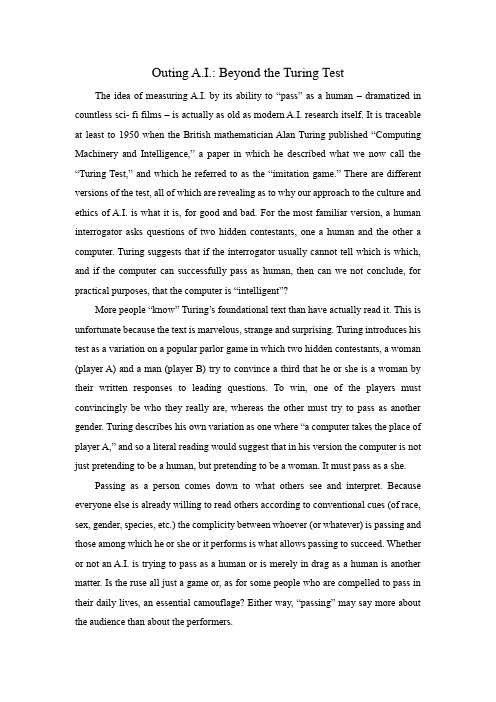
Outing A.I.: Beyond the Turing TestThe idea of measuring A.I. by its ability to “pass” as a human – dramatized in countless sci- fi films – is actually as old as modern A.I. research itself. It is traceable at least to 1950 when the British mathematician Alan Turing published “Computing Machinery and Intelligence,” a paper in which he described what we now call the “Turing Test,” and which he referred to as the “imitation game.” There are different versions of the test, all of which are revealing as to why our approach to the culture and ethics of A.I. is what it is, for good and bad. For the most familiar version, a human interrogator asks questions of two hidden contestants, one a human and the other a computer. Turing suggests that if the interrogator usually cannot tell which is which, and if the computer can successfully pass as human, then can we not conclude, for practical purposes, that the computer is “intelligent”?More people “know” Turing’s foundational text than have actually read it. This is unfortunate because the text is marvelous, strange and surprising. Turing introduces his test as a variation on a popular parlor game in which two hidden contestants, a woman (player A) and a man (player B) try to convince a third that he or she is a woman by their written responses to leading questions. To win, one of the players must convincingly be who they really are, whereas the other must try to pass as another gender. Turing describes his own variation as one where “a computer takes the place of player A,” and so a literal reading would suggest that in his version the computer is not just pretending to be a human, but pretending to be a woman. It must pass as a she.Passing as a person comes down to what others see and interpret. Because everyone else is already willing to read others according to conventional cues (of race, sex, gender, species, etc.) the complicity between whoever (or whatever) is passing and those among which he or she or it performs is what allows passing to succeed. Whether or not an A.I. is trying to pass as a human or is merely in drag as a human is another matter. Is the ruse all just a game or, as for some people who are compelled to pass in their daily lives, an essential camouflage? Either way, “passing” may say more about the audience than about the performers.That we would wish to define the very existence of A.I. in relation to its ability to mimic how humans think that humans think will be looked back upon as a weird sort of speciesism. The legacy of that conceit helped to steer some older A.I. research down disappointingly fruitless paths, hoping to recreate human minds from available parts. It just doesn’t work that way. Contemporary A.I. research suggests instead that the threshold by which any particular arrangement of matter can be said to be “intelligent” doesn’t have much to do with how it reflects humanness back at us. As Stuart Russell and Peter Norvig (now director of research at Google) suggest in their essential A.I. textbook, biomorphic imitation is not how we design complex technology. Airplanes don’t fly like birds fly, and we certainly don’t try to trick birds into thinking that airplanes are birds in order to test whether those planes “really” are flying machines. Why do it for A.I. then? Today’s serious A.I. research does not focus on the Turing Test as an objective criterion of success, and yet in our popular culture of A.I., the test’s anthropocentrism holds such durable conceptual importance. Like the animals who talk like teenagers in a Disney movie, other minds are conceivable mostly by way of puerile ventriloquism.Where is the real injury in this? If we want everyday A.I. to be congenial in a humane sort of way, so what? The answer is that we have much to gain from a more sincere and disenchanted relationship to synthetic intelligences, and much to lose by keeping illusions on life support. Some philosophers write about the possible ethical “rights” of A.I. as sentient entities, but that’s not my point here. Rather, the truer perspective is also the better one for us as thinking technical creatures.Musk, Gates and Hawking made headlines by speaking to the dangers that A.I. may pose. Their points are important, but I fear were largely misunderstood by many readers. Relying on efforts to program A.I. not to “harm humans” (inspired by Isaac Asimov’s “three laws” of robotics from 1942) makes sense only when an A.I. knows what humans are and what harming them might mean. There are many ways that an A.I. might harm us that have nothing to do with its malevolence toward us, and chief among these is exactly following our well-meaning instructions to an idiotic and catastrophic extreme. Instead of mechanical failure or a transgression of moral code, the A.I. maypose an existential risk because it is both powerfully intelligent and disinterested in humans. To the extent that we recognize A.I. by its anthropomorphic qualities, or presume its preoccupation with us, we are vulnerable to those eventualities.Whether or not “hard A.I.” ever appears, the harm is also in the loss of all that we prevent ourselves from discovering and understanding when we insist on protecting beliefs we know to be false. In the 1950 essay, Turing offers several rebuttals to his speculative A.I., including a striking comparison with earlier objections to Copernican astronomy. Copernican traumas that abolish the false centrality and absolute specialness of human thought and species-being are priceless accomplishments. They allow for human culture based on how the world actually is more than on how it appears to us from our limited vantage point. Turing referred to these as “theological objections,” but one could argue that the anthropomorphic precondition for A.I. is a “pre-Copernican” attitude as well, however secular it may appear. The advent of robust inhuman A.I. may let us achieve another disenchantment, one that should enable a more reality-based understanding of ourselves, our situation, and a fuller and more complex understanding of what “intelligence” is and is not. From there we can hopefully make our world with a greater confidence that our models are good approximations of what’s out there.人工智能:超越图灵实验以人工智能“冒充”人的能力的来衡量人工智能的这个概念---已经被数不清的科幻电影搬上了荧幕---实际上已经和现代人工智能研究一样久远了。
“韩素音青年翻译奖”竞赛汉译英之体感
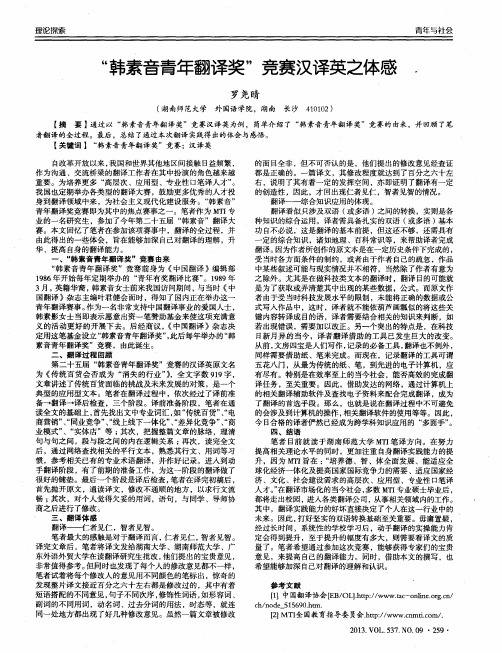
【 关键 词 】 “ 韩素音青年翻译 奖”竞赛 ;汉译英
自改革 开放以来 , 我 国和世界其他地 区间接触 日益频繁 , 作为沟通 、交 流桥梁的翻译工作者在其 中扮演 的角色越来越 重要 。为培养更 多 “ 高层次 、应用型 、专业性 口笔译 人才” 。 我 国也定期举办 各类 型的翻译大赛 ,鼓励更 多优 秀的人才投 身到翻译领域 中来 ,为社会主义现代化建设 服务 。“ 韩素音 ” 青年翻译奖竞赛 即为其 中的焦点赛 事之 一。笔者作为 M T I 专 业 的一名研究 生 ,参加了今年第二十五届 “ 韩 素音”翻译大 赛 。本文 回忆 了笔者 在参 加该项赛事 中 ,翻译 的全过程 ,并 由此得 出的一些 体会 ,旨在能够加深 自己对 翻译 的理解 ,升 华 、提高 自身 的翻泽能力 。 “ 韩素 音青年翻译奖”竞赛 由来 “ 韩 素音青年 翻译奖 ”竞赛前 身为 《 中国翻译 》编辑 部 1 9 8 6年 开始每年定期举办 的 “ 青 年有奖翻译 比赛 ” 。1 9 8 9年 3月 , 英籍华裔 , 韩 素音 女士前来 我国访 问期间 , 与 当时 《 中 国翻译 》杂 志主编叶君健会面 时 ,得 知了国 内正在举办这一 青年翻译赛事 。 作为一名非常支持 中国翻译事业 的爱 国人士 , 韩素影女 士当即表示 愿意 出资一笔赞助 基金来 使这项充满意 义 的活动更好 的开展 下去 。后 经商议 , 《中国翻译 》杂 志决 定用这笔基金设立 “ 韩素音青年翻译奖” , 此后每年举办的 “ 韩 素音青年翻译奖 ”竞赛 ,由此诞生 。
一
、
二 、 翻 译 过 程 回 顾
第二十五届 “ 韩素音青年 翻译 奖”竞赛 的汉译英原文名 为《 传 统百货 会否成 为 “ 消 失的行业 ” 》 ,全 文字数 9 1 9 字, 文章讲述 了传统 百货面临 的挑 战及未来 发展 的对策 ,是一个 典型 的应用 型文本。笔者在翻译过程 中 ,依 次经过了译前准 备一翻译—译 后检查 ,三个 阶段 。译前 准备 阶段 ,笔者在通 读全文 的基础上 , 首先找 出文 中专业词汇 , 如“ 传统百货 ” 、 “ 电 商营销 ” 、 “ 同业竞争 ” 、 “ 线上线下一体化 ” 、 “ 差异化竞争 ” 、 “ 商 业模式 ” 、“ 实体 店”等 ; 其次 ,把握整篇 文章的脉络 ,理清 句与句之 间 ,段 与段之间的 内在逻辑关 系 ; 再次 ,读完全文 后 ,通过 网络查 找相关的平行文本 ,熟悉其行 文 、用词等习 惯 ,参考相关 已有 的专业术语 翻译 ,并作好 记录。进 入到动 手翻译 阶段 , 有 了前 期的准备工作 , 为这一 阶段 的翻译做 了 很好的铺垫 。最后一个 阶段是译后检查 , 笔者在译完初稿后 , 首先抛开原 文 ,通读译文 ,修改不通顺 的地方 ,以求行文流 畅; 其次 ,对个人觉 得欠妥的用词 ,语句 ,与同学 、导师协 商之后进行 了修改 。 三、翻译体感 翻译— —仁者见仁 ,智者见智 。 笔 者最大的感触是对于翻译而言 , 仁者见仁 , 智者见智 。 译完文章后 ,笔者将译文发给湖南大学 、湖南师 范大学 、广 东外语外贸大学在读 翻译研究生批改 , 他们提 出的宝贵 意见 , 非常值得参考 。 但 同时也发现 了每个人 的修改 意见都不 一样 , 笔者试着将 每个 修改人的意见用不 同颜 色的笔标 出 ,惊奇 的 发现整片译 文接 近百分之六十左右都是修 改过的 ,其 中有着 短语搭配 的不 同意见 , 句子不 同次序 , 修饰性词语 , 如形容词 、 副词 的不 同用词 ,动名词 、过去分词 的用法 ,时态等 ,就连 同一处地方都 出现了好几种修改意见 。虽然 一篇 文章被修改
2022韩素音国际翻译大赛(英译汉)二等奖译文
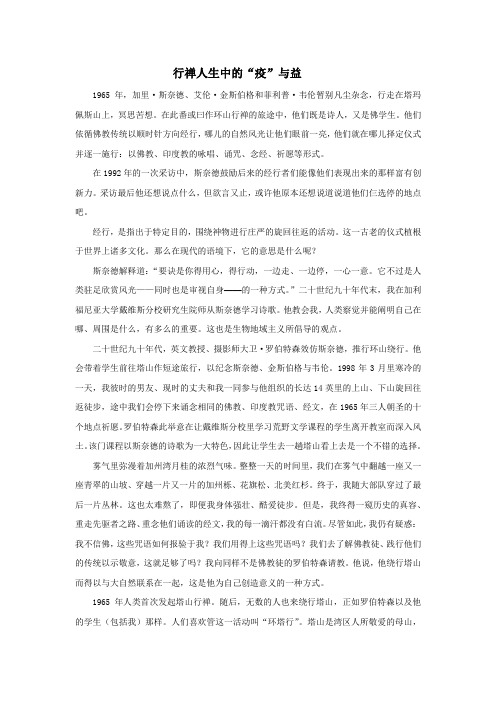
行禅人生中的“疫”与益1965年,加里·斯奈德、艾伦·金斯伯格和菲利普·韦伦暂别凡尘杂念,行走在塔玛佩斯山上,冥思苦想。
在此番或曰作环山行禅的旅途中,他们既是诗人,又是佛学生。
他们依循佛教传统以顺时针方向经行,哪儿的自然风光让他们眼前一亮,他们就在哪儿择定仪式并逐一施行:以佛教、印度教的咏唱、诵咒、念经、祈愿等形式。
在1992年的一次采访中,斯奈德鼓励后来的经行者们能像他们表现出来的那样富有创新力。
采访最后他还想说点什么,但欲言又止,或许他原本还想说道说道他们仨选停的地点吧。
经行,是指出于特定目的,围绕神物进行庄严的旋回往返的活动。
这一古老的仪式植根于世界上诸多文化。
那么在现代的语境下,它的意思是什么呢?斯奈德解释道:“要诀是你得用心,得行动,一边走、一边停,一心一意。
它不过是人类驻足欣赏风光——同时也是审视自身——的一种方式。
”二十世纪九十年代末,我在加利福尼亚大学戴维斯分校研究生院师从斯奈德学习诗歌。
他教会我,人类察觉并能阐明自己在哪、周围是什么,有多么的重要。
这也是生物地域主义所倡导的观点。
二十世纪九十年代,英文教授、摄影师大卫·罗伯特森效仿斯奈德,推行环山绕行。
他会带着学生前往塔山作短途旅行,以纪念斯奈德、金斯伯格与韦伦。
1998年3月里寒冷的一天,我彼时的男友、现时的丈夫和我一同参与他组织的长达14英里的上山、下山旋回往返徒步,途中我们会停下来诵念相同的佛教、印度教咒语、经文,在1965年三人朝圣的十个地点祈愿。
罗伯特森此举意在让戴维斯分校里学习荒野文学课程的学生离开教室而深入风土。
该门课程以斯奈德的诗歌为一大特色,因此让学生去一趟塔山看上去是一个不错的选择。
雾气里弥漫着加州湾月桂的浓烈气味。
整整一天的时间里,我们在雾气中翻越一座又一座青翠的山坡、穿越一片又一片的加州栎、花旗松、北美红杉。
终于,我随大部队穿过了最后一片丛林。
这也太难熬了,即便我身体强壮、酷爱徒步。
第二十二届韩素音青年翻译奖竟赛英译汉译文和译文评析

英译汉Hidden Within Technology’s Empire, a Republic of Letters隐藏于技术帝国的文学界索尔•贝妻When I was a boy “discovering literature”, I used to think how wonderful it would be if every other person on the street were familiar with Proust and Joyce or T. E. Lawrence or Pasternak and Kafka. Later I learned how refractory to high culture the democratic masses were. Lincoln as a young frontiersman read Plutarch, Shakespeare and the Bible. But then he was Lincoln.我还是个"探索文学"的少年时,就经常在想:要是大街上人人都熟悉普鲁斯特和乔伊斯,熟悉T.E.劳伦斯,熟悉帕斯捷尔纳克和卡夫卡,该有多好啊!后来才知道,平民百姓对高雅文化有多排斥。
虽说少年时代身居边陲的林肯就在阅读普鲁塔克,、莎士比亚和《圣经》,但他毕竟是林肯。
Later when I was traveling in the Midwest by car, bus and train, I regularly visited small-town libraries and found that readers in Keokuk, Iowa, or Benton Harbor, Mich., were checking out Proust and Joyce and even Svevo and Andrei Biely. D. H. Lawrence was also a favorite. And sometimes I remembered that God was willing to spare Sodom for the sake of 10 of the righteous. Not that Keokuk was anything like wicked Sodom, or that Proust’s Charlus would have been tempted to settle in Benton Harbor, Mich. I seem to have had a persistent democratic desire to find evidences of high culture in the most unlikely places.后来,我坐小车、巴士和火车在中西部旅行,经常走访小镇图书馆;发现在衣阿华州基奥卡克市,或者密歇根州本顿港市,读者们借阅普鲁斯特和乔伊斯的作品,甚至还有斯维沃@和安德烈•别雷®的著作。
韩素音青年翻译奖竞赛原文

韩素音青年翻译奖竞赛原文第二十六届“韩素音青年翻译奖”竞赛原文英译汉竞赛原文:How the News Got Less MeanThe most read article of all time on BuzzFeed contains no photographs of celebrity nip slips and no inflammatory ranting. It’s a series of photos called “21 pictures that will restore your faith in humanity,”which has pulled in nearly 14 million visits so far. At Upworthy too, hope is the major draw. “This kid just died. What he left behind is wondtacular,”an Upworthy post about a terminally ill teen singer, earned 15 million views this summer and has raised more than $300,000 for cancer research.The recipe for attracting visitors to stories online is changing. Bloggers have traditionally turned to sarcasm and snark to draw attention. But the success of sites like BuzzFeed and Upworthy, whose philosophies embrace the viral nature of upbeat stories, hints that the Web craves positivity.The reason: social media. Researchers are discovering that people want to create positive images of themselves online by sharing upbeat stories. And with more people turning to Facebook and Twitter to find out what’s happening in the world, news stories may need to cheer up inorder to court an audience. If social is the future of media, then optimistic stories might be media’s future.“When we started, the prevailing wisdom was that snark ruled the Internet,”says Eli Pariser, a co-founder of Upworthy. “And we just had a really different sense of what works.”“You don’t want to be that guy at the party who’s crazy and angry and ranting in the corner —it’s the same for Twitteror Facebook,”he says. “Part of what we’re trying to d o with Upworthy is give people the tools to express a conscientious, thoughtful and positive identity in social media.”And the science appears to support Pariser’s philosophy. In a recent study from the Massachusetts Institute of Technology, researchers f ound that “up votes,”showing that a visitor liked a comment or story, begat more up votes on comments on the site, but “down votes”did not do the same. In fact, a single up vote increased the likelihood that someone else would like a comment by 32%, wherea s a down vote had no effect. People don’t want to support the cranky commenter, the critic or the troll. Nor do they want to be that negative personality online.In another study published in 2012, Jonah Berger, author of Contagious: Why Things Catch On and professor of marketing at the Wharton School of the University of Pennsylvania, monitored the most e-mailed stories produced by the New York Times for six months andfound that positive stories were more likely to make the list than negative ones.“What we share [or like] is almost like the car we drive or the clothes we wear,”he says. “It says something about us to other people. So people would much rather be seen as a Positive Polly than a Debbie Downer.”It’s not always that simple: Berger says that th ough positive pieces drew more traffic than negative ones, within the categories of positive and negative stories, those articles that elicited more emotion always led to more shares.“Take two negative emotions, for example: anger and sadness,”Berger says. “Both of those emotions would make the reader feel bad. But anger, a high arousal emotion, leads to moresharing, whereas sadness, a low arousal emotion, doesn’t. The same is true of the positive side: excitement and humor increase sharing, whereas conte ntment decreases sharing.”And while some popular BuzzFeed posts —like the recent “Is this the most embarrassing interview Fox News has ever done?”—might do their best to elicit shares through anger, both BuzzFeed and Upworthy recognize that their main success lies in creating positive viral material.“It’s not that people don’t share negative stories,”says Jack Shepherd, editorial director at BuzzFeed. “It just means that there’s ahigher potential for positive stories to do well.”Upworthy’s mission is to highlight serious issues but in a hopeful way, encouraging readers to donate money, join organizations and take action. The strategy seems to be working: barely two years after its launch date (in March 2012), the site now boasts 30 million unique visitors per month, according to Upworthy. The site’s average monthly unique visitors grew to 14 million people over its first six quarters —to put that in perspective, the Huffington Post had only about 2 million visitors in its first six quarters online.But Upworthy measures the success of a story not just by hits. The creators of the site only consider a post a success if it’s also shared frequently on social media. “We are interested in content that people want to share partly for pragmatic reasons,”Pariser s ays. “If you don’t have a good theory about how to appear in Facebook and Twitter, then you may disappear.”Nobody has mastered the ability to make a story go viral like BuzzFeed. The site, which began in 2006 as a lab to figure out what people share onlin e, has used what it’s learned to draw 60million monthly unique visitors, according to BuzzFeed. (Most of that traffic comes from social-networking sites, driving readers toward BuzzFeed’s mix of cute animal photos and hard news.) By comparison the New York Times website, one of the most popular newspaper sites on the Web,courts only 29 million unique visitors each month, according to the Times.BuzzFeed editors have found that people do still read negative or critical stories, they just aren’t the posts t hey share with their friends. And those shareable posts are the ones that newsrooms increasingly prize.“Anecdotally, I can tell you people are just as likely to click on negative stories as they are to click on positive ones,”says Shepherd. “But they’re m ore likely to share positive stories. What you’re interested in is different from what you want your friends to see what you’re interested in.”So as newsrooms re-evaluate how they can draw readers and elicit more shares on Twitter and Facebook, they may look to BuzzFeed’s and Upworthy’s happiness model for direction.“I think that the Web is only becoming more social,”Shepherd says. “We’re at a point where readers are your publishers. If news sites aren’t thinking about what it would mean for someone to share a story on social media, that could be detrimental.”汉译英竞赛原文:城市的迷失沿着瑗珲—腾冲线,这条1935年由胡焕庸先生发现并命名的中国人口、自然和历史地理的分界线,我们看到,从远距离贸易发展开始的那天起,利益和权力的渗透与分散,已经从根本结构上改变了城市的状态:城市在膨胀,人在疏离。
第22届韩素音翻译大赛 英译汉 参考译文
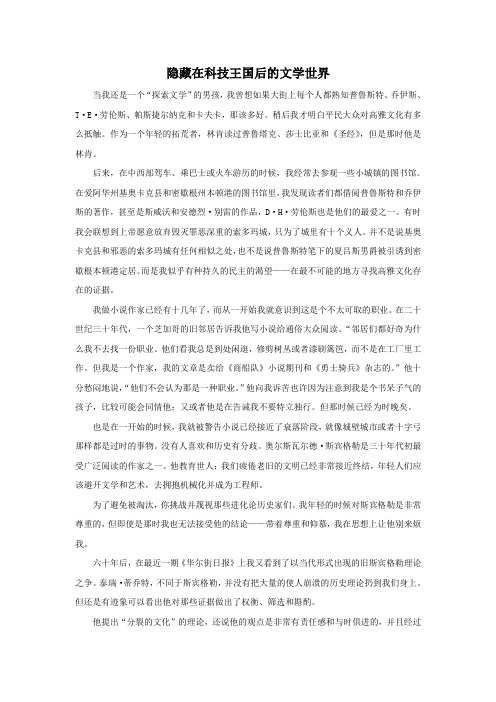
隐藏在科技王国后的文学世界当我还是一个“探索文学”的男孩,我曾想如果大街上每个人都熟知普鲁斯特、乔伊斯、T·E·劳伦斯、帕斯捷尔纳克和卡夫卡,那该多好。
稍后我才明白平民大众对高雅文化有多么抵触。
作为一个年轻的拓荒者,林肯读过普鲁塔克、莎士比亚和《圣经》,但是那时他是林肯。
后来,在中西部驾车、乘巴士或火车游历的时候,我经常去参观一些小城镇的图书馆。
在爱阿华州基奥卡克县和密歇根州本顿港的图书馆里,我发现读者们都借阅普鲁斯特和乔伊斯的著作,甚至是斯威沃和安德烈·别雷的作品,D·H·劳伦斯也是他们的最爱之一。
有时我会联想到上帝愿意放弃毁灭罪恶深重的索多玛城,只为了城里有十个义人。
并不是说基奥卡克县和邪恶的索多玛城有任何相似之处,也不是说普鲁斯特笔下的夏吕斯男爵被引诱到密歇根本顿港定居。
而是我似乎有种持久的民主的渴望——在最不可能的地方寻找高雅文化存在的证据。
我做小说作家已经有十几年了,而从一开始我就意识到这是个不太可取的职业。
在二十世纪三十年代,一个芝加哥的旧邻居告诉我他写小说给通俗大众阅读。
“邻居们都好奇为什么我不去找一份职业。
他们看我总是到处闲逛,修剪树丛或者漆刷篱笆,而不是在工厂里工作。
但我是一个作家,我的文章是卖给《商船队》小说期刊和《勇士骑兵》杂志的。
”他十分愁闷地说,“他们不会认为那是一种职业。
”他向我诉苦也许因为注意到我是个书呆子气的孩子,比较可能会同情他;又或者他是在告诫我不要特立独行。
但那时候已经为时晚矣。
也是在一开始的时候,我就被警告小说已经接近了衰落阶段,就像城壁城市或者十字弓那样都是过时的事物。
没有人喜欢和历史有分歧。
奥尔斯瓦尔德·斯宾格勒是三十年代初最受广泛阅读的作家之一。
他教育世人:我们疲倦老旧的文明已经非常接近终结,年轻人们应该避开文学和艺术,去拥抱机械化并成为工程师。
为了避免被淘汰,你挑战并蔑视那些进化论历史家们。
历届韩素音翻译大奖赛竞赛原文及译文详解
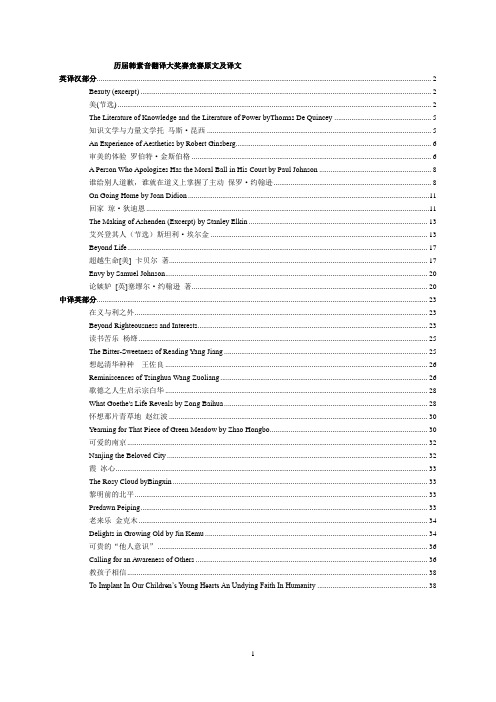
历届韩素音翻译大奖赛竞赛原文及译文英译汉部分 (2)Beauty (excerpt) (2)美(节选) (2)The Literature of Knowledge and the Literature of Power byThomas De Quincey (5)知识文学与力量文学托马斯.昆西 (5)An Experience of Aesthetics by Robert Ginsberg (6)审美的体验罗伯特.金斯伯格 (6)A Person Who Apologizes Has the Moral Ball in His Court by Paul Johnson (8)谁给别人道歉,谁就在道义上掌握了主动保罗.约翰逊 (8)On Going Home by Joan Didion (11)回家琼.狄迪恩 (11)The Making of Ashenden (Excerpt) by Stanley Elkin (13)艾兴登其人(节选)斯坦利.埃尔金 (13)Beyond Life (17)超越生命[美] 卡贝尔著 (17)Envy by Samuel Johnson (20)论嫉妒[英]塞缪尔.约翰逊著 (20)中译英部分 (23)在义与利之外 (23)Beyond Righteousness and Interests (23)读书苦乐杨绛 (25)The Bitter-Sweetness of Reading Yang Jiang (25)想起清华种种王佐良 (26)Reminiscences of Tsinghua Wang Zuoliang (26)歌德之人生启示宗白华 (28)What Goethe's Life Reveals by Zong Baihua (28)怀想那片青草地赵红波 (30)Yearning for That Piece of Green Meadow by Zhao Hongbo (30)可爱的南京 (32)Nanjing the Beloved City (32)霞冰心 (33)The Rosy Cloud byBingxin (33)黎明前的北平 (33)Predawn Peiping (33)老来乐金克木 (34)Delights in Growing Old by Jin Kemu (34)可贵的“他人意识” (36)Calling for an Awareness of Others (36)教孩子相信 (38)To Implant In Our Children’s Young Hearts An Undying Faith In Humanity (38)英译汉部分Beauty (excerpt)美(节选)Judging from the scientists I know, including Eva and Ruth, and those whom I've read about, you can't pursue the laws of nature very long without bumping撞倒; 冲撞into beauty. “I don't know if it's the same beauty you see in the sunset,”a friend tells me, “but it feels the same.”This friend is a physicist, who has spent a long career deciphering破译(密码), 辨认(潦草字迹) what must be happening in the interior of stars. He recalls for me this thrill on grasping for the first time Dirac's⑴equations describing quantum mechanics, or those o f Einstein describing relativity. “They're so beautiful,” he says, “you can see immediately they have to be true. Or at least on the way toward truth.” I ask him what makes a theory beautiful, and he replies, “Simplicity, symmetry .对称(性); 匀称, 整齐, elegance, and power.”我结识一些科学家(包括伊娃和露丝),也拜读过不少科学家的著作,从中我作出推断:人们在探求自然规律的旅途中,须臾便会与美不期而遇。
第二十五届韩素英翻译大赛原文
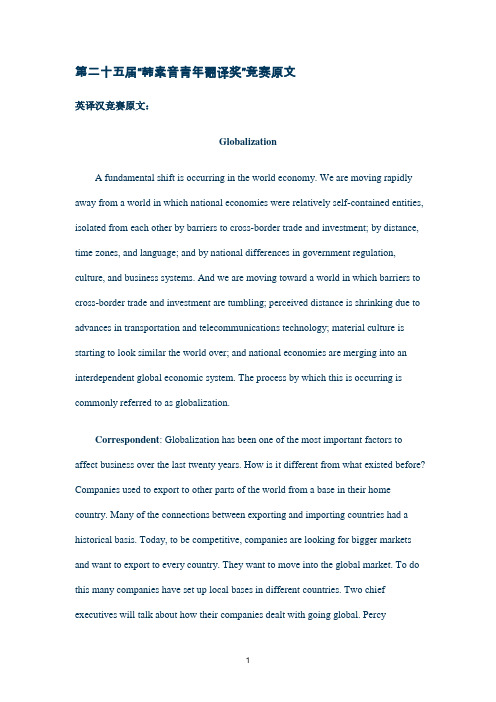
第二十五届“韩素音青年翻译奖”竞赛原文英译汉竞赛原文:GlobalizationA fundamental shift is occurring in the world economy. We are moving rapidly away from a world in which national economies were relatively self-contained entities, isolated from each other by barriers to cross-border trade and investment; by distance, time zones, and language; and by national differences in government regulation, culture, and business systems. And we are moving toward a world in which barriers to cross-border trade and investment are tumbling; perceived distance is shrinking due to advances in transportation and telecommunications technology; material culture is starting to look similar the world over; and national economies are merging into an interdependent global economic system. The process by which this is occurring is commonly referred to as globalization.Correspondent: Globalization has been one of the most important factors to affect business over the last twenty years. How is it different from what existed before? Companies used to export to other parts of the world from a base in their home country. Many of the connections between exporting and importing countries had a historical basis. Today, to be competitive, companies are looking for bigger markets and want to export to every country. They want to move into the global market. To do this many companies have set up local bases in different countries. Two chief executives will talk about how their companies dealt with going global. PercyBarnevik, one of the world’s most admired business leaders when he was Chairman of the international engineering group ABB and Dick Brown of telecommunications provider Cable & Wireless.Cable & Wireless already operates in many countries and is well-placed to take advantage of the increasingly global market for telecommunications. For Dick Brown globalization involves the economies of countries being connected to each other and companies doing business in many countries and therefore having multinational accounts.Dick Brown: The world is globalizing and the telecommunications industry is becoming more and more global, and so we feel we’re well-positioned in that market place. You see currency markets are more global tied, economies are globally connected, more so nowadays with expanded trade, more and more multinational accounts are doing business in many, many more countries. We’re a company at Cable & Wireless now, well-positioned to carry the traffic and to provide the services to more and more companies that now need to get to five countries or twelvec ountries, we’re often there.Correspondent: When Percy Barnevik became head of the international engineering group ABB, his task was to make globalization work. He decided to divide the business into over a thousand smaller companies. In this way he believed the company could be both global and local. In answering the question “How do you make globalization work?”, Percy Barnevik describes the “global glue” that keeps themany different people in ABB together. He then looks at the need to manage the three contradictions of company: it is decentralized but centrally controlled, it is big and small at the same time and it is both global and local.Percy Barnevik: We have now for ten years after our big merger created a “global glue” where people are tied together, where they don’t internally compete, but support each other, and you have global leaders with global responsibility and your local managers working with their profit centers, and if you have the right, so to say, agenda for these people and the right structure, you can use a scale of economy and your advantages of bigness but being small. We used to say you have three contradictions: decentralized and still centrally controlled, big and small, global and local, and, of course, to try to make these contradictions work together effectively, then I think you have a big organizational competitive edge.Correspondent: Globalizations can bring advantage to a business, but how does a company go global? Dick Brown mentions three ways companies can achieve “globalness”. Firstly, companies can work together in alliances. Secondly, they can acquire or buy other companies, and thirdly they can grow organically by expanding from their existing base.Dick Brown: Well, as you go global, and a handful or more of companies are going to really push out, in my view, to be truly global companies, and some of them, maybe all of them, will also work to be local. They’ll be local in chosen markets and global in their ability to carry their customers’ needs from continent A to c ontinent B.We want to be one of the companies that’s both global and local. Alliances are one way to be global, it’s not the only way to be global; you can acquire your way to “globalness”, you can organically grow your way to “globalness”, you can have alliances which help you get global quicker, so you take your pick.Percy Barnevik: You have to start from the top with local people who understand language, culture and so on, and I think in this global world where the East is coming up now, that’s a winni ng recipe.Correspondent: ABB already found the winning recipe. Its theory of globalization has become the company’s working practice. So how do you make theory work in practice? Percy Barnevik believes that successful globalization involves getting people to work together, overcoming national, cultural barriers and making the organization customer-driven.Percy Barnevik: You see the easy thing is to have the theory, but then to make the systems work, to make people really work together, to trust each other —Americans, Europeans, Asians, to get over these national cultural barriers and create a common glue, ABB, and then make them customer-driven. If you can achieve that, and create that culture deep down then I think you have an important competitive edge.Correspondent: What Dick Brown and Percy Barnevik have shown is that there are different routes to globalization and that companies have to work hard to succeed in going global. Actually one of the disadvantages of the Global Strategy is thatintegrated competitive moves can lead to the sacrificing of revenues, profits, or competitive positions in individual countries — especially when the subsidiary in one country is told to attack a global competitor in order to convey a signal or divert that competitor’s resources from another nation. The challenges managers of transnational corporations face are to identify and exploit cross-border synergies and to balance local demands with the global vision for the corporation. Building an effective transnational organization requires a corporate culture that values global dissimilarities across cultures and markets.汉译英竞赛原文:传统百货会否成为“消失的行业”数据显示,2011年中国电子商务市场整体交易规模达到7万亿元,同比增长46.4%。
第28届韩素音翻译比赛汉译英原文和参考译文(下)
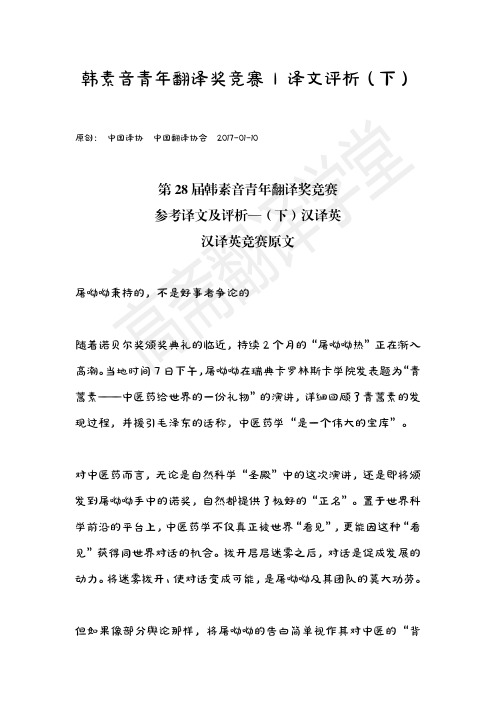
韩素音青年翻译奖竞赛 | 译文评析(下) 原创: 中国译协 中国翻译协会 2017-01-10第28届韩素音青年翻译奖竞赛参考译文及评析—(下)汉译英汉译英竞赛原文屠呦呦秉持的,不是好事者争论的随着诺贝尔奖颁奖典礼的临近,持续2个月的“屠呦呦热”正在渐入高潮。
当地时间7日下午,屠呦呦在瑞典卡罗林斯卡学院发表题为“青蒿素——中医药给世界的一份礼物”的演讲,详细回顾了青蒿素的发现过程,并援引毛泽东的话称,中医药学“是一个伟大的宝库”。
对中医药而言,无论是自然科学“圣殿”中的这次演讲,还是即将颁发到屠呦呦手中的诺奖,自然都提供了极好的“正名”。
置于世界科学前沿的平台上,中医药学不仅真正被世界“看见”,更能因这种“看见”获得同世界对话的机会。
拨开层层迷雾之后,对话是促成发展的动力。
将迷雾拨开、使对话变成可能,是屠呦呦及其团队的莫大功劳。
但如果像部分舆论那样,将屠呦呦的告白简单视作其对中医的“背书”,乃至将其成就视作中医向西医下的“战书”,这样的心愿固然可嘉,却可能完全背离科学家的本意。
听过屠呦呦的报告,或是对其研究略作了解就知道,青蒿素的发现既来自于中医药“宝库”提供的积淀和灵感,也来自于西医严格的实验方法。
缺了其中任意一项,历史很可能转向截然不同的方向。
换言之,在“诺奖级”平台上促成中西医对话之前,屠呦呦及其团队的成果,正是长期“对话”的成果。
而此前绵延不绝的“中西医”之争,多多少少都游离了对话的本意,而陷于一种单向化的“争短长”。
持中医论者,不屑于西医的“按部就班”;持西医论者,不屑于中医的“随心所欲”。
双方都没有看到,“按部就班”背后本是实证依据,“随心所欲”背后则有文化内涵,两者完全可以兼容互补,何必非得二元对立?屠呦呦在演讲中坦言,“通过抗疟药青蒿素的研究历程,我深深地感到中西医药各有所长,两者有机结合,优势互补,当具有更大的开发潜力和良好的发展前景”。
这既是站在中医药立场上对西方科学界的一次告白,反过来也可理解为西医立场上对中医拥趸们的提醒。
第23届韩素音青年翻译奖竞赛参考译文

英译汉原文:Are We There Yet?America’s recovery will be much slower than that from most recessions; but the government can help a bit.“WHITHER goest thou, America?” That question, posed by Jack Kerouac on behalf of the Beat generation half a century ago, is the biggest uncertainty hanging over the world economy. And it reflects the foremost worry for American voters, who go to the polls for the congressional mid-term elections on November 2nd with the country’s unemployment rate stubbornly stuck at nearly one in ten. They should prepare themselves for a long, hard ride.The most wrenching recession since the 1930s ended a year ago. But the recovery—none too powerful to begin with—slowed sharply earlier this year. GDP grew by a feeble 1.6% at an annual pace in the second quarter, and seems to have been stuck somewhere similar since. The housing market slumped after temporary tax incentives to buy a home expired. So few private jobs were being created that unemployment looked more likely to rise than fall. Fears grew over the summer that if this deceleration continued, America’s economy would slip back into recession.Fortunately, those worries now seem exaggerated. Part of the weakness of second-quarter GDP was probably because of a temporary surge in imports from China. The latest statistics, from reasonably good retail sales in August to falling claims for unemployment benefits, point to an economy that, though still weak, is not slumping further. And history suggests that although nascent recoveries often wobble for a quarter or two, they rarely relapse into recession. For now, it is most likely that America’s economy will crawl along with growth at perhaps 2.5%: above stall speed, but far too slow to make much difference to the jobless rate.Why, given that America usually rebounds from recession, are the prospects so bleak? That’s because most past recessions have been caused by tight monetary policy. When policy is loosened, demand rebounds. This recession was the result of a financial crisis. Recoveries after financial crises are normally weak and slow as banking systems are repaired and balance-sheets rebuilt. Typically, this period of debt reduction lasts around seven years, which means America would emerge from it in 2014. By some measures, households are reducing their debt burdens unusually fast, but even optimistic seers do not think the process is much more than half over.Battling on the busAmerica’s biggest problem is that its poli ticians have yet to acknowledge that the economy is in for such a long, slow haul, let alone prepare for the consequences.A few brave officials are beginning to sound warnings that the jobless rate is likely to “stay high”. But the political debate is mor e about assigning blame for the recession than about suggesting imaginative ways to give more oomph to the recovery. Republicans argue that Barack Obama’s shift towards “big government” explainsthe economy’s weakness, and that high unemployment is proof t hat fiscal stimulus was a bad idea. In fact, most of the growth in government to date has been temporary and unavoidable; the longer-run growth in government is more modest, and reflects the policies of both Mr Obama and his predecessor. And the notion that high joblessness “proves” that stimulus failed is simply wrong. The mechanics of a financial bust suggest that without a fiscal boost the recession would have been much worse.Democrats have their own class-warfare version of the blame game, in which Wall Street’s excesses caused the problem and higher taxes on high-earners are part of the solution. That is why Mr. Obama’s legislative priority before the mid-terms is to ensure that the Bush tax cuts expire at the end of this year for households earning more than $250,000 but are extended for everyone else.This takes an unnecessary risk with the short-term recovery. America’s experience in 1937 and Japan’s in 1997 are powerful evidence that ill-timed tax rises can tip weak economies back into recession. Higher taxes at the top, along with the waning of fiscal stimulus and belt-tightening by the states, will make a weak growth rate weaker still. Less noticed is that Mr. Obama’s fiscal plan will also worsen the medium-term budget mess, by making tax cuts for the middle class permanent.Ways to overhaul the engineIn an ideal world America would commit itself now to the medium-term tax reforms and spending cuts needed to get a grip on the budget, while leaving room to keep fiscal policy loose for the moment. But in febrile, partisan Washington that is a pipe-dream. Today’s goals can only be more modest: to nurture the weak economy, minimize uncertainty and prepare the ground for tomorrow’s fiscal debate. To that end, Congress ought to extend all the Bush tax cuts until 2013. Then they should all expire—prompting a serious fiscal overhaul, at a time when the economy is stronger.A broader set of policies could help to work off the hangover faster. One priority is to encourage more write-downs of mortgage debt. Almost a quarter of all Americans with mortgages owe more than their houses are worth. Until that changes the vicious cycle of rising foreclosures and falling prices will continue. There are plenty of ideas on offer, from changing the bankruptcy law so that judges can restructure mortgage debt to empowering special trustees to write down loans. They all have drawbacks, but a fetid pool of underwater mortgages will, much like Japan’s loans to zombie firms, corrode the financial system and harm the recovery.C leaning up the housing market would help cut America’s unemployment rate, by making it easier for people to move to where jobs are. But more must be done to stop high joblessness becoming entrenched. Payroll-tax cuts and credits to reduce the cost of hiring would help. (The health-care reform, alas, does the opposite, at least for small businesses.) Politicians will also have to think harder about training schemes, because some workers lack the skills that new jobs require.Americans are used to great distances. The sooner they, and their politicians, acceptthat the road to recovery will be a long one, the faster they will get there.译文:我们到达目的地了吗?与大多数衰退之后的复苏相比,这次美国经济的复苏会慢得多。
父爱的尺度(翻译)解读
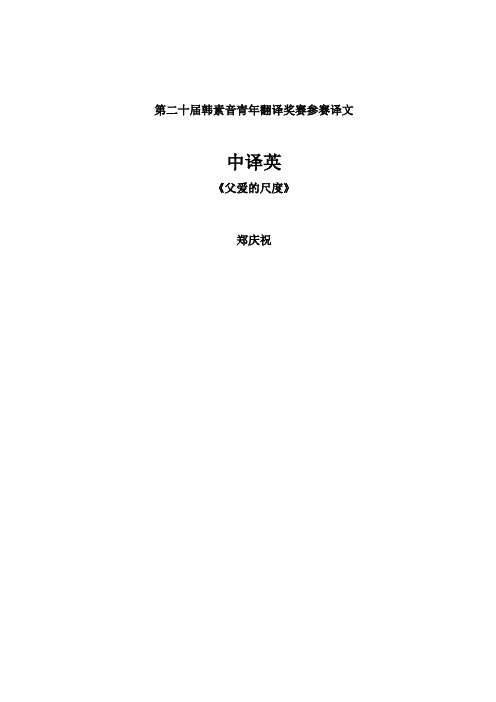
第二十届韩素音青年翻译奖赛参赛译文中译英《父爱的尺度》郑庆祝The Yardstick of Father’s Love (excerpt)In 1924, U.S. President John Calvin Coolidge (1872-1933) proposed the Father’s Day a nation-wide festival so as to “establish more intimate relations between fathers and their children and to impress upon fathers the full measure of their obligations". In 1972, President Richard Nixon (1913-1994) officially signed the bill to designate the Father’s Day a festival, which later spread around the world gradually. Today, Chinese townsfolk, who always value parenthood education and emphasize father’s cultivation responsibility, accept the foreign festival imperceptibly.The Chinese style of nuclear family nursing with only a single child is quite similar as that of running a company of unlimited liability; the parents have to assume unlimited responsibility for the future fate of their children. As the saying says, “If the children are not well-bred, it is the father's fault”. The children’s wisdom and stupidity, gain and loss, and merits and faults are related to education from the father. The father shall not only bear the joint responsibility for raising the children and for their moral education, but also be investigated the “leader’s responsibility”by the society and other family members. Benefit of successful education to a single child cannot be anticipated, but the opportunity cost for failure of the education is one hundred percent. Therefore, the father is the good example—the “yardstick”of the children, which is quite hard to grasp.Father is also called “Jia Yan”, which is used to refer to one’s own father modestly. The role of father’s love already has its accurate, specific and rational definition from the prospective of Chinese traditional culture, ethical code and custom. “A father should be respectable and a mother should be intimate”means that a father must retain the duly reverence and keep self-esteem so that he can win respect from his family members, and then maintain the dignity to be the primary responsibility bearer for conducting family education. “If the king is not honest, his ministers will go to other countries; if a father is not honest, his children will run away from home”, viz. the father should set himself a good example to his children; otherwise, he can neither hold together or cultivate his children, nor fulfill the disciplining responsibility of a father, and may even bring about falling out with his children. A father should be strict, stern and serious, and a mother should be kind, thus, to be strict, stern and serious are necessary characters a father should possess. But some fathers misinterpret “strict, stern and serious” as educating children with sticks, or by beating and scolding. I get some inspiration from Dhyana that the purpose of beating and scolding is for spurring, reminding, giving advice and revealing, and the goal is to facilitate understanding and gain wisdom, while not to squelch, let alone to show the patriarchal power and prestige. Therefore, a competent father values more knowledge than his temper, and cherishes more wisdom than his superiority; he is the first teacher and spiritual guide of his children.Parents without exception expect their children to become talents, and save no efforts to help their children in this regard. Influenced by the family, indeed, many children succeed their parents’careers, adding glory to their ancestors and bringing benefits to their offspring, and turning themselves into the same kind of persons as their parents or the persons expected by their parents. But there are still a large number of people do not realize their parents’ dream or do not reach their parents’ expectation, and some of them even fall just the opposite side of their parents’expectation. As the saying goes, “Like father, like son—a child will follow his/her father’s suit”; “The son of a warrior knows weapons early.” But also as the saying runs, “Good parents do not always have good children.”After all, home education also faces the problem of taking different education measures towards different children, and giving children the freedom of choosing their own career paths, so that they can do a better job by themselves according to their own interests, hobbies and strong points. Like all flowers are not in one garland, every person has his/her own dreams and ambitions. Thus we cannot force others to do things according to our own will, and so do parents to their children.Western countries emphasize affection, care and encouragement in education, and traditional Chinese education philosophy puts strictness on face, while burying deep love in heart. The Chinese-style “Jia Yan”is an external manifestation between the father and the children—love and affection are its central character, and care is its real intention. As an oldChinese saying goes, “If a father is not affectionate, his son will not be filial”. The father is not kind and responsible, so his children are neither outstanding or excellent, nor filial or attached to their father. But “like a fierce tiger, excessive love from parents may bring suffering to the children,”—the unprincipled praise and encouragement, and the excessive spoil and indulgence may change a child into a mediocre one, who is ignorant, incapable, dawdle, asinine and apathetic, and of no ambition at all; and may also turn a child into an unfilial one, who is overweening, hubris and unruly. Therefore, the yardstick of strictness and loving kindness is hard to tailor—over strictness will suppress individuality, but excessive loving kindness will encourage bad habits.“Pathetic are the feelings of all parents under heaven towards their children,”—love from parents is of no reservation, but asking for nothing in return. To be an eligible father is far more than a learning process. As a matter of fact, it is really an austere trial, and a long and highly difficult comprehensive examination.父爱的尺度(节选)1924年,美国总统卡尔文·柯立芝建议把父亲节作为一个全国性的节日,以便“在父亲和子女间建立更亲密的关系,并且使父亲铭记自己应尽的全部责任”。
汉译英短文翻译(5篇)

汉译英短文翻译(5篇)第一篇:汉译英短文翻译汉译英短文翻译近年来,中国城市化进人加速阶段,取得了极大的成就,同时也出现了种种错综复杂的问题。
今天的城乡建设速度之快、规模之大、耗资之巨、涉及面之广、尺度之大等已远非生产力低下时期所能及,建筑已成为一种重大的经济活动。
(102字)难点注释:1)城市化urbanization2)加速阶段an accelerating phase3)错综复杂的问题some complicated problems4)远非?一所能及surpass5)重大的经济活动a major economic pursuit世界各地有3,600万人染上了艾滋病—这比整个澳大利亚的人口还多。
目前,艾滋病是全球第4大死因,而在非洲则是头号罪魁。
在非洲,艾滋病使工人丧失工作,使家庭丧失经济来源,使父母丧失孩子。
在7个非洲国家中,巧岁至49岁的人口中艾滋病病毒感染者占到20%以上。
(119字)难点注释:1)染上艾滋病suffer from AIDS2)头号罪魁the chief culprit3)使……丧失deprive of 4)艾滋病病毒感染者people infected with HIV当今中国,对传真机的使用已十分普及,并成为现代重要的通讯终端设备。
据一项调查显示,2002年,中国市场对传真机的需求量约为200万台,国内产量仅满足了约30%的需求,进口机占据市场的主导地位。
(89字)难点注释:1)传真机fax machines2)通讯终端设备telecommunications terminal equipment3)占主导地位dominate2000年,美国数码相机的销量达到惊人的510万台,而1999年只有310万台。
数码相机的流行其原因非常简单:成像质量好且花费少。
此外,使用数码相机还能省去不少麻烦。
你不用买胶卷,所有的照片都被存在可反复使用的存储卡上。
一按快门,就可以马上在液晶显示屏上观察照片的效果。
“CATTI杯”第二十七届韩素音青年翻译奖竞赛-英译汉
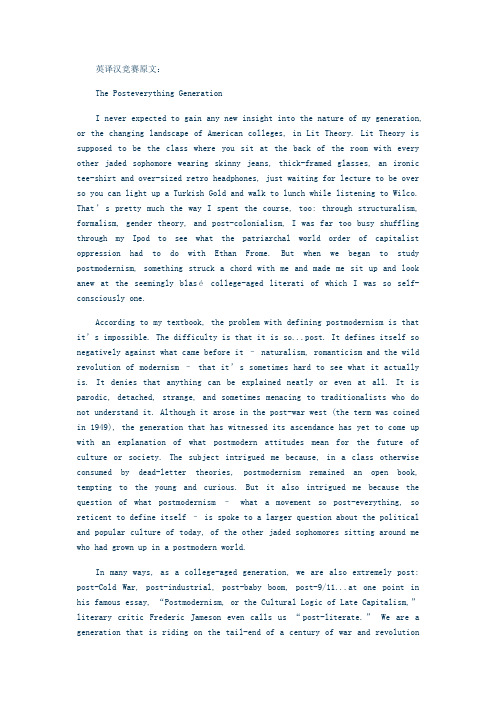
英译汉竞赛原文:The Posteverything GenerationI never expected to gain any new insight into the nature of my generation, or the changing landscape of American colleges, in Lit Theory. Lit Theory is supposed to be the class where you sit at the back of the room with every other jaded sophomore wearing skinny jeans, thick-framed glasses, an ironic tee-shirt and over-sized retro headphones, just waiting for lecture to be over so you can light up a Turkish Gold and walk to lunch while listening to Wilco. That’s pretty much the way I spent the course, too: through structuralism, formalism, gender theory, and post-colonialism, I was far too busy shuffling through my Ipod to see what the patriarchal world order of capitalist oppression had to do with Ethan Frome. But when we began to study postmodernism, something struck a chord with me and made me sit up and look anew at the seemingly blasécollege-aged literati of which I was so self-consciously one.According to my textbook, the problem with defining postmodernism is that it’s impossible. The difficulty is that it is so...post. It defines itself so negatively against what came before it – naturalism, romanticism and the wild revolution of modernism – that it’s sometimes hard to see what it actually is. It denies that anything can be explained neatly or even at all. It is parodic, detached, strange, and sometimes menacing to traditionalists who do not understand it. Although it arose in the post-war west (the term was coined in 1949), the generation that has witnessed its ascendance has yet to come up with an explanation of what postmodern attitudes mean for the future of culture or society. The subject intrigued me because, in a class otherwise consumed by dead-letter theories, postmodernism remained an open book, tempting to the young and curious. But it also intrigued me because the question of what postmodernism –what a movement so post-everything, so reticent to define itself – is spoke to a larger question about the political and popular culture of today, of the other jaded sophomores sitting around me who had grown up in a postmodern world.In many ways, as a college-aged generation, we are also extremely post: post-Cold War, post-industrial, post-baby boom, post-9/11...at one point in his famous essay, “Postmodernism, or the Cultural Logic of Late Capitalism,”literary critic Frederic Jameson even calls us “post-literate.”We are a generation that is riding on the tail-end of a century of war and revolutionthat toppled civilizations, overturned repressive social orders, and left us with more privilege and opportunity than any other society in history. Ours could be an era to accomplish anything.And yet do we take to the streets and the airwaves and say “here we are, and this is what we demand”? Do we plant our flag of youthful rebellion on the mall in Washington and say “we are not leaving until we see change! Our eyes have been opened by our education and our conception of what is possible has been expanded by our privilege and we demand a better world because it is our right”? It would seem we do the opposite. We go to war without so much as questioning the rationale, we sign away our civil liberties, we say nothing when the Supreme Court uses Brown v. Board of Education to outlaw desegregation, and we sit back to watch the carnage on the evening news.On campus, we sign petitions, join organizations, put our names on mailing lists, make small-money contributions, volunteer a spare hour to tutor, and sport an entire wardrobe’s worth of Live Strong bracelets advertising our moderately priced opposition to everything from breast cancer to global warming. But what do we really stand for? Like a true postmodern generation we refuse to weave together an overarching narrative to our own political consciousness, to present a cast of inspirational or revolutionary characters on our public stage, or to define a specific philosophy. We are a story seemingly without direction or theme, structure or meaning – a generation defined negatively against what came before us. When Al Gore once said “It’s the combination of narcissism and nihilism that really defines postmodernism,” he might as well have been echoing his entire generation’s critique of our own. We are a generation for whom even revolution seems trite, and therefore as fair a target for bland imitation as anything else. We are the generation of the Che Geuvera tee-shirt.Jameson calls it “Pastiche”–“the wearing of a linguistic mask, speech in a dead language.” In literature, this means an author speaking in a style that is not his own – borrowing a voice and continuing to use it until the words lose all meaning and the chaos that is real life sets in. It is an imitation of an imitation, something that has been re-envisioned so many times the original model is no longer relevant or recognizable. It is mass-produced individualism, anticipated revolution. It is why postmodernism lacks cohesion, why it seems to lack purpose or direction. For us, the post-everything generation, pastiche is the use and reuse of the old clichés of social changeand moral outrage – a perfunctory rebelliousness that has culminated in the age of rapidly multiplying non-profits and relief funds. We live our lives in masks and speak our minds in a dead language – the language of a society that expects us to agitate because that’s what young people do. But how do we rebel against a generation that is expecting, anticipating, nostalgic for revolution?How do we rebel against parents that sometimes seem to want revolution more than we do? We don’t. We rebel by not rebelling. We wear the defunct masks of protest and moral outrage, but the real energy in campus activism is on the internet, with websites like . It is in the rapidly developing ability to communicate ideas and frustration in chatrooms instead of on the streets, and channel them into nationwide projects striving earnestly for moderate and peaceful change: we are the generation of Students Taking Action Now Darfur; we are the Rock the Vote generation; the generation of letter-writing campaigns and public interest lobbies; the alternative energy generation.College as America once knew it –as an incubator of radical social change –is coming to an end. To our generation the word “radicalism”evokes images of al Qaeda, not the Weathermen. “Campus takeover” sounds more like Virginia Tech in 2007 than Columbia University in 1968. Such phrases are a dead language to us. They are vocabulary from another era that does not reflect the realities of today. However, the technological revolution, the revolution, the revolution of the organization kid, is just as real and just as profound as the revolution of the 1960’s – it is just not as visible. It is a work in progress, but it is there. Perhaps when our parents finally stop pointing out the things that we are not, the stories that we do not write, they will see the threads of our narrative begin to come together; they will see that behind our pastiche, the post generation speaks in a language that does make sense. We are writing a revolution. We are just putting it in our own words.。
- 1、下载文档前请自行甄别文档内容的完整性,平台不提供额外的编辑、内容补充、找答案等附加服务。
- 2、"仅部分预览"的文档,不可在线预览部分如存在完整性等问题,可反馈申请退款(可完整预览的文档不适用该条件!)。
- 3、如文档侵犯您的权益,请联系客服反馈,我们会尽快为您处理(人工客服工作时间:9:00-18:30)。
Hidden Within Technology‟s Empire, a Republic of Letters隐藏于技术帝国的文学界索尔•贝妻When I was a boy “discovering literature”, I used to think how wonderful it would be if every other person on the street were familiar with Proust and Joyce or T. E. Lawrence or Pasternak and Kafka. Later I learned how refractory to high culture the democratic masses were. Lincoln as a young frontiersman read Plutarch, Shakespeare and the Bible. But then he was Lincoln.我还是个"探索文学"的少年时,就经常在想:要是大街上人人都熟悉普鲁斯特和乔伊斯,熟悉T.E.劳伦斯,熟悉帕斯捷尔纳克和卡夫卡,该有多好啊!后来才知道,平民百姓对高雅文化有多排斥。
虽说少年时代身居边陲的林肯就在阅读普鲁塔克,、莎士比亚和《圣经》,但他毕竟是林肯。
Later when I was traveling in the Midwest by car, bus and train, I regularly visited small-town libraries and found that readers in Keokuk, Iowa, or Benton Harbor, Mich., were checking out Proust and Joyce and even Svevo and Andrei Biely. D. H. Lawrence was also a favorite. And sometimes I remembered that God was willing to spare Sodom for the sake of 10 of the righteous. Not that Keokuk was anything like wicked Sodom, or that Proust‟s Cha rlus would have been tempted to settle in Benton Harbor, Mich. I seem to have had a persistent democratic desire to find evidences of high culture in the most unlikely places.后来,我坐小车、巴士和火车在中西部旅行,经常走访小镇图书馆;发现在衣阿华州基奥卡克市,或者密歇根州本顿港市,读者们借阅普鲁斯特和乔伊斯的作品,甚至还有斯维沃@和安德烈•别雷®的著作。
D. H.劳伦斯的书也深受欢迎。
有时我会想起上帝愿为十个义人而饶恕所多玛城的故事^并非基奧卡克市和邪恶的所多玛有何相似之处,也并非普鲁斯特笔下的夏吕斯®想移居密西根州的本顿港,只不过我似乎一直有一种开明的想法,希望在最难觅高雅文化的地方找到高雅文化的证据。
For many decades now I have been a fiction writer, and from the first I was aware that mine was a questionable occupation. In the 1930‟s an elderly neighbor in Chicago told me that he wrote fiction for the pulps. “The people on the block wonder why I don‟t go to a job, and I‟m seen putteri ng around, trimming the bushes or painting a fence instead of working in a factory. But I‟m a writer. I sell to Argosy and Doc Savage,” he said with a certain gloom. “They wouldn‟t call that a trade.” Probably he noticed that I was a bookish boy, likely to sympathize with him, and perhaps he was trying to warn me to avoid being unlike others. But it was too late for that.至今,我已写了几十年小说,而且一开始就意识到,这是个颇有争议的职业。
20世纪30年代,芝加哥一位年长的邻居告诉我,他给通俗杂志写小说。
"街坊邻里都纳闷,为什么不去上班,却见我游来荡去,修剪修剪树木,粉刷粉刷篱笆,就是不去工厂干活儿。
可我是作家啊,稿子卖给《大商船》和《萨维奇医生》⑦那些杂志,"他说话时神情有些抑郁。
"他们不会把这当作正事儿。
"他很可能已经觉察到,我是个喜欢读书的孩子,兴许会与他产生共鸣,或者他想提醒我,不要与众不同,但这为时已晚。
From the first, too, I had been warned that the novel was at the point of death, that like the walled city or the crossbow, it was a thing of the past. And no one likes to be at odds with history. Oswald Spengler, one of the most widely read authors of the early 30‟s, taught that our tired old civilization was very nearly finished. His advice to the young was to avoid literature and the arts and to embrace mechanization and become engineers.一开始也有人告诫我,小说正频临死亡,犹如城郭或弓弩,已属昨日之物。
谁也不愿和历史作对。
奥斯瓦尔德•斯宾格勒*——30年代初拥有最广泛读者的作者之--曾教导我们,陈腐、古老的文明已几近末路,建议年轻人避开文学和艺术,拥抱机械化,去当工程师。
In refusing to be obsolete, you challenged and defied the evolutionist historians. I had great respect for Spengler in my youth, but eve n then I couldn‟t accept his conclusions, and (with respect and admiration) I mentally told him to get lost.你拒绝被淘汰,就是对进化论史学家的挑战和蔑视。
年轻时我非常尊重斯宾格勒,但即使那个时候,也无法接受他的结论,而(怀着敬慕之情)在心里对他说:你走远点吧。
Sixty years later, in a recent issue of The Wall Street Journal, I come upon the old Spenglerian argument in a contemporary form. Terry Teachout, unlike Spengler, does not dump paralyzing mountains of historical theory upon us, but there are signs that he has weighed, sifted and pondered the evidence.时隔60年,在最近一期《华尔街日报》上,偶见斯宾格勒式老调新弹。
跟斯宾格勒不同,特里•蒂奇奥特并没有将一座座令人窒息的史论大山压在我们身上,但迹象表明,他权衡、筛选、思索过相关证据。
He speaks of our “atomized culture,” and his is a responsible, up-to-date and carefully considered opinion. He speaks of “art forms as technologies.” He tells us that movies will soon be “downloadable”—that is, transferable from one computer to the memory of another device—and predicts that films will soon be marketed like books. He predicts that the near-magical powers of technology are bringing us to the threshold of a new age and conclu des, “Once this happens, my guess is that the independent movie will replace the novel as the principal vehicle for serious story telling in the 21st century.”他谈到了我们的"原子化文化",观点新颖可靠,并经过深思熟虑,谈到了"作为技术的艺术形式",告诉我们,电影很快就"可以下载",即从一台电脑转入另一存储设备。
他还预测,电影不久会如书籍般销售。
他预言近乎魔法的技术之力将把我们引入一个新时代,并得出结论:"一旦这成为现实,我猜想,独立电影会替代小说,成为21世纪严肃故事叙述的主要载体。
